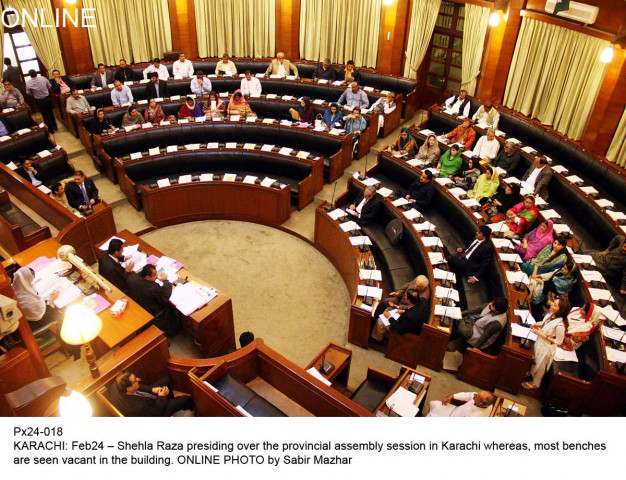Sindhi, Punjabi, Balochi & Pashto should be declared national languages: SA
Before Partition, Sindhi had the status of a national language: PML-F MPA Mahtab Akbar Rashdi.

File photo of Sindh Assembly. PHOTO: ONLINE/FILE
Moving the resolution, Pakistan Muslim League – Functional (PML-F) assembly member Mahtab Akbar Rashdi said that before Partition, the Sindhi language had the status of a national language, which it unfortunately does not hold any more.
She added that Pakistan’s neighboring country India has given 22 languages the status of national languages.
“The government of India has declared even Sindhi a national language, but we are deliberately ignoring it,” Rashidi said.
The members of Pakistan People's Party (PPP), Muttahida Qaumi Movement (MQM), Pakistan Muslim League – Nawaz (PML-N) and Pakistan Tehreek-e-Insaf (PTI) supported the resolution.
Speaking on the occasion, Sindh Minister for Parliamentary Affairs Dr Sikandar Mandhro referred to a resolution moved by his party MNA Nawab Yousuf Talpur in National Assembly some time ago. He said that the resolution was referred to a special committee where it didn’t find much support.
The MQM member Khalid Ahmed suggested that the languages of Hazara and Seraiki people should also be included in the resolution.
Mir Hazar Khan Bijarani was of the view that people are emotionally attached with their mother-tongue, therefore, all regional languages should be given this status without delay.
“During the British rule Sindhi was the official language of the province and it was strictly implemented in all courts and offices. No doubt Urdu is our national language, but the same status must be given to Sindhi and other regional languages,” he added.
Sindh Assembly also adopted a motion to ensure that the Sindhi language must be taught in all private and public schools, and colleges in the province.
Resolution against attacks
Sindh Assembly unanimously adopted a resolution against attacks on mosques, temples, churches, the police force, the Frontier Corps and armed forces. It demanded law-enforcement agencies and the federal government establish the writ of state.



















COMMENTS
Comments are moderated and generally will be posted if they are on-topic and not abusive.
For more information, please see our Comments FAQ